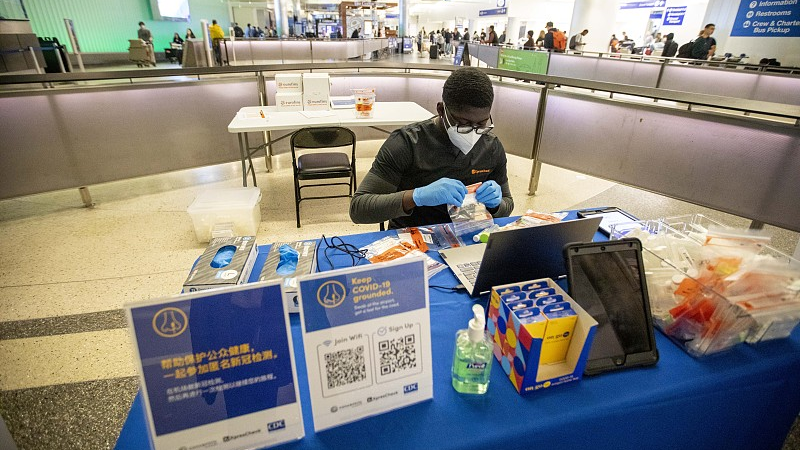
A CDC COVID-19 variant testing site inside Tom Bradley International Terminal at Los Angeles International Airport in Los Angeles, California, U.S., January 9, 2023. /CFP
A CDC COVID-19 variant testing site inside Tom Bradley International Terminal at Los Angeles International Airport in Los Angeles, California, U.S., January 9, 2023. /CFP
Editor's note: Jiang Shisong is a research fellow with the School of Law, Chongqing University. The article reflects the author's opinions and not necessarily the views of CGTN.
The optimization of China's COVID-19 response, combined with a decline in severe cases and a decrease in the current surge of infections, suggests that the country has successfully managed its COVID-19 situation. Accordingly, China reopened to the world after three years of arduous battles, providing a strong tonic for both the domestic and global recovery.
Nevertheless, a handful of states, such as the U.S., France and South Korea, have imposed travel curbs and required COVID-19 tests for air passengers from China, which have caused friction in international relations and raised concerns about its legality under international law.
The International Health Regulations (IHR) is the primary legal instrument that governs international health issues, including the control of the spread of infectious diseases. The IHR provides that states may take measures to prevent the international spread of disease, but these measures must be proportionate and non-discriminatory. In the context of the COVID-19 pandemic, this means that states must take measures that are necessary to protect public health and that do not unjustifiably restrict international trade and travel.
Regarding the requirement for negative COVID-19 tests for air passengers traveling from China, the question is whether these measures are proportionate and non-discriminatory. Proportionality, as a fundamental principle of international law, requires measures taken in response to a threat to be proportional to the severity of that threat. In other words, measures taken to control the spread of the coronavirus and its variants should not be excessive or impose undue hardships on affected individuals or groups.
Demanding negative tests from China travelers has been criticized as being excessive, since it imposes significant restrictions on travel and trade without scientific evidence of a higher risk of transmission associated with travel from China specifically.
In addition, the U.S., among other countries, continues to experience high levels of COVID-19 infections, which questions the necessity of such stringent measures for travelers coming from China. Furthermore, research on the efficacy of COVID-19 testing for air travel has shown that negative test results do not guarantee freedom from infection, as pre-symptomatic and asymptomatic carriers could spread the virus.

A view of the Charles-de-Gaulle airport in Paris, France, January 4, 2023. /CFP
A view of the Charles-de-Gaulle airport in Paris, France, January 4, 2023. /CFP
COVID-19 travel curbs are not only dubious in terms of their efficacy in reducing the spread of the virus but also raise concerns about discrimination and unequal treatment. By singling out travelers from China and imposing stricter measures on them compared to travelers from other countries, these measures are discriminatory in nature. This goes against the principle of non-discrimination enshrined in numerous international treaties, including the International Covenant on Civil and Political Rights and the International Covenant on Economic, Social and Cultural Rights, which holds that all individuals and groups should be treated equally and without prejudice, regardless of their nationality or origin.
Additionally, the requirement for negative COVID-19 tests constitutes a violation of the freedom of movement, a right protected under international law. The freedom of movement allows individuals to leave any country and enter their own country freely. The imposition of negative COVID-19 tests limits this freedom for Chinese citizens, making it harder for them to travel and enter other countries.
Last but not least, the requirement for negative COVID-19 tests for air passengers traveling from China is not in alignment with the principle of mutual assistance and cooperation between states, which is also a fundamental principle of international law. The principle mandates states to collaborate to tackle global health issues, including the COVID-19 pandemic. However, the requirement for negative COVID-19 tests hinders this cooperation by unfairly targeting a particular group and risking a decline in trust between states.
In response to the recent imposition of strict measures for air passengers from China, several potential legal options are available. Affected individuals or organizations can challenge the measures in national or international courts, basing the challenge on human rights, such as non-discrimination and freedom of movement, or international trade and investment laws.
China can also engage in diplomatic efforts to resolve the measures by negotiating with the relevant states or seeking support from international organizations including the World Health Organization or World Trade Organization.
Finally, China has the option of taking countermeasures against the measures imposed by other countries, such as imposing similar restrictions on air passengers from the countries concerned or taking trade or investment measures.
The COVID-19 pandemic highlights the significance of international solidarity and cooperation in addressing global health challenges. Using travel curbs as a political tool can risk violating international law and causing deeper divisions. In light of the ongoing pandemic, cooperation between states has never been more pressing.
(If you want to contribute and have specific expertise, please contact us at opinions@cgtn.com. Follow @thouse_opinions on Twitter to discover the latest commentaries in the CGTN Opinion Section.)